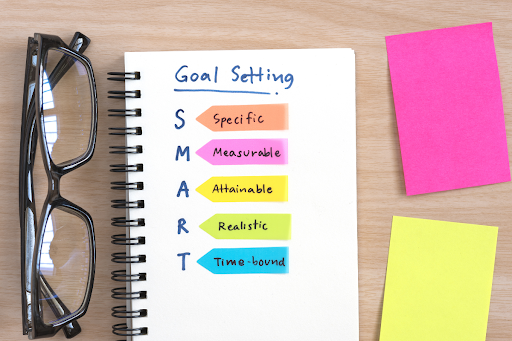How to Set Realistic Goals for Your Acting Career
Contents
ToggleHow often as an actor have you felt a little stuck? Your lofty ideas of conquering Hollywood in a matter of years may have not come to fruition and you’re feeling unmotivated and adrift.
One of the biggest problems many actors face during their careers is the feeling that despite their exhaustive efforts, they’re not progressing.
In reality, many actors are achieving great things. The challenge is that often their benchmark has been set too high for them to see this or they have no way of measuring their successes.
The solution to this is really quite simple, but something so many actors just don’t do – setting realistic goals to guide and motivate them.
The Importance Of Goal Setting
Goal setting is quite a remarkable tool that anybody in any career, life stage, financial position or similar can engage in.
Goal setting works in several ways:
- It helps you keep focused on things that are important to you
- It fosters better motivation and feelings of achievement
- It makes us stop, consider and visualise what we want our life to look like
- It encourages proper planning and strategising
Without clear goals, it is much easier to feel lost, lacking in purpose and that your potential is being wasted.
What Are Realistic Goals?
A realistic goal is one you can achieve with the skills and timeframe available, and with your current level of motivation.
They need to be attainable based on where you are now not reliant on other factors falling into place. They also need to be things you genuinely believe you can achieve!
Stand Out.
Check our term dates, and enrol in classes today.
Why Do My Goals Need To Be Realistic?
It’s great to have really big long-term goals or dreams – we’re not saying you’re not the next Margot Robbie or Chris Hemsworth!
However, if you don’t have realistic achievable goals that are attainable in the shorter term, you’re likely to get lost on the journey to that ultimate destination and frequently feel discouraged.
Think of a basic to-do list of errands for your day off as an example. Even if you did nothing more than grocery shop and take out the rubbish, that feeling of satisfaction and achievement from clearing the list is great, right?
Your goals should offer you this same positive motivation, so starting small and outlining things you can achieve in the short term is key.

1. Get Writing
Start by writing down your goals, they can be as attainable or far-fetched as you like. The intention is to acknowledge your goals and then gain some perspective surrounding them.
We suggest keeping the list as concise as you can as this makes it easier to focus.
Taking a step back and looking at your goals will help you define them, prioritise the most important ones and tweeze out those that are realistic for here and now.
2. Apply the SMART Principle
Once you have figured out your goals, check them against the SMART principle – i.e. your goals should be:
Specific – There is no room for ambiguity with goal setting!
Measurable – Is there a way to track your progress towards its achievement?
Attainable – It must be something you can actually accomplish.
Realistic – Is it something that is relevant and achievable within your career, skills, and experience?
Time-Oriented – Goals must have a firm deadline, without this, there’s no real push to achieve.
3. Determine Your Strategy
What do you need to achieve your goals? Do you need to seek external support or invest money in achieving it? What information or training might you need to bring your goal to fruition?
Depending on your goal, this step will look a little different for everyone.
4. Plan
How does this goal and its timeline work into your future plans? What do you need to do each day, week or month to ensure you are actively working toward your goal?
5. Evaluate
If you find your goal deadline is looming and you’re not on track or other factors outside your control have pushed you off schedule, it’s okay!
Stopping to evaluate your goals along the way and allowing some flexibility means you’re more likely to reach them at some point. Just as we change, our goals can also evolve and adapt to what we need.
If your goals are no longer serving you well, go ahead and adjust them until they match where you are and what you want to achieve.
Examples Of Realistic Acting Goals
So what do realistic goals look like for actors? They might include:
- Attend more acting classes
- Undertake study in directing or screenwriting
- Expand your network of contacts by attending more industry events
- Find a job that works around your acting schedule
- Participate in more auditions each month
Remember, while these goals are all achievable, you must make them more specific using the SMART method. This ensures proper strategising and planning for consistent movement towards achieving them.
For added motivation, you may like to set these goals as components of a larger goal and mark them off as milestones on your way to the top!
Reach Your Destination Sooner With The Actors Pulse
At The Actors Pulse, we understand the importance of setting goals as an actor and the role ongoing learning plays in achieving them.
If you’re feeling unmotivated and lost in your acting journey, we’re here to help.
As the leading school for the Meisner Technique in the Southern Hemisphere, we offer the best possible environment in which to reconnect with your love of acting.
Our dedicated teachers are focused on helping our students set realistic goals and supporting them to reach them. Call 0414 475 515 today to enquire about acting classes in Sydney.

Billy Milionis is one of the few Australians to have ever studied under the legendary master teacher, the late Sanford Meisner. Billy has also studied story structure and scene analysis techniques with John Truby and later at UCLA. He has also spent several years doing improvisation in Hollywood with the L.A. Connection. In addition, he trained in the technique of Stella Adler, Practical Aesthetics and Lee Strasberg’s method.





